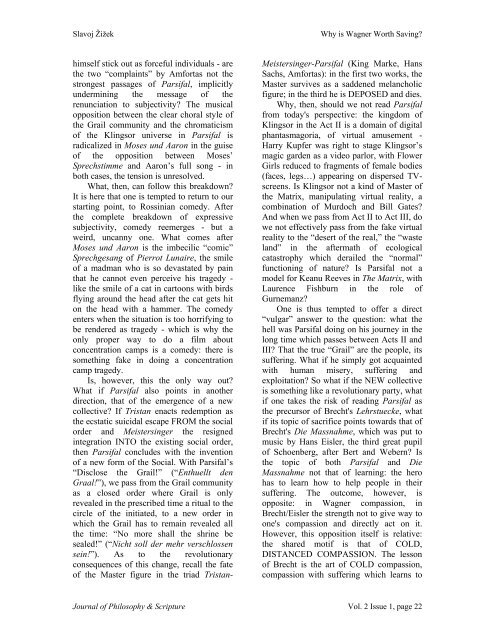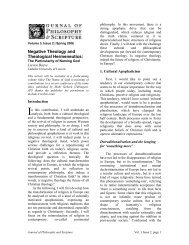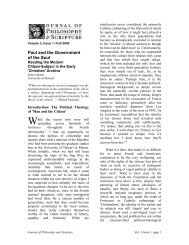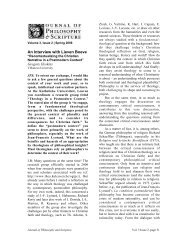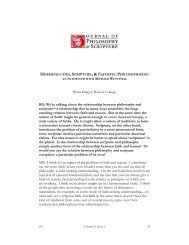Why is Wagner Worth Saving? Slavoj Žižek - Journal of Philosophy ...
Why is Wagner Worth Saving? Slavoj Žižek - Journal of Philosophy ...
Why is Wagner Worth Saving? Slavoj Žižek - Journal of Philosophy ...
Create successful ePaper yourself
Turn your PDF publications into a flip-book with our unique Google optimized e-Paper software.
<strong>Slavoj</strong> Žižek<br />
<strong>Why</strong> <strong>is</strong> <strong>Wagner</strong> <strong>Worth</strong> <strong>Saving</strong>?<br />
himself stick out as forceful individuals - are<br />
the two “complaints” by Amfortas not the<br />
strongest passages <strong>of</strong> Parsifal, implicitly<br />
undermining the message <strong>of</strong> the<br />
renunciation to subjectivity? The musical<br />
opposition between the clear choral style <strong>of</strong><br />
the Grail community and the chromatic<strong>is</strong>m<br />
<strong>of</strong> the Klingsor universe in Parsifal <strong>is</strong><br />
radicalized in Moses und Aaron in the gu<strong>is</strong>e<br />
<strong>of</strong> the opposition between Moses’<br />
Sprechstimme and Aaron’s full song - in<br />
both cases, the tension <strong>is</strong> unresolved.<br />
What, then, can follow th<strong>is</strong> breakdown?<br />
It <strong>is</strong> here that one <strong>is</strong> tempted to return to our<br />
starting point, to Rossinian comedy. After<br />
the complete breakdown <strong>of</strong> expressive<br />
subjectivity, comedy reemerges - but a<br />
weird, uncanny one. What comes after<br />
Moses und Aaron <strong>is</strong> the imbecilic “comic”<br />
Sprechgesang <strong>of</strong> Pierrot Lunaire, the smile<br />
<strong>of</strong> a madman who <strong>is</strong> so devastated by pain<br />
that he cannot even perceive h<strong>is</strong> tragedy -<br />
like the smile <strong>of</strong> a cat in cartoons with birds<br />
flying around the head after the cat gets hit<br />
on the head with a hammer. The comedy<br />
enters when the situation <strong>is</strong> too horrifying to<br />
be rendered as tragedy - which <strong>is</strong> why the<br />
only proper way to do a film about<br />
concentration camps <strong>is</strong> a comedy: there <strong>is</strong><br />
something fake in doing a concentration<br />
camp tragedy.<br />
Is, however, th<strong>is</strong> the only way out?<br />
What if Parsifal also points in another<br />
direction, that <strong>of</strong> the emergence <strong>of</strong> a new<br />
collective? If Tr<strong>is</strong>tan enacts redemption as<br />
the ecstatic suicidal escape FROM the social<br />
order and Me<strong>is</strong>tersinger the resigned<br />
integration INTO the ex<strong>is</strong>ting social order,<br />
then Parsifal concludes with the invention<br />
<strong>of</strong> a new form <strong>of</strong> the Social. With Parsifal’s<br />
“D<strong>is</strong>close the Grail!” (“Enthuellt den<br />
Graal!”), we pass from the Grail community<br />
as a closed order where Grail <strong>is</strong> only<br />
revealed in the prescribed time a ritual to the<br />
circle <strong>of</strong> the initiated, to a new order in<br />
which the Grail has to remain revealed all<br />
the time: “No more shall the shrine be<br />
sealed!” (“Nicht soll der mehr verschlossen<br />
sein!”). As to the revolutionary<br />
consequences <strong>of</strong> th<strong>is</strong> change, recall the fate<br />
<strong>of</strong> the Master figure in the triad Tr<strong>is</strong>tan-<br />
Me<strong>is</strong>tersinger-Parsifal (King Marke, Hans<br />
Sachs, Amfortas): in the first two works, the<br />
Master survives as a saddened melancholic<br />
figure; in the third he <strong>is</strong> DEPOSED and dies.<br />
<strong>Why</strong>, then, should we not read Parsifal<br />
from today's perspective: the kingdom <strong>of</strong><br />
Klingsor in the Act II <strong>is</strong> a domain <strong>of</strong> digital<br />
phantasmagoria, <strong>of</strong> virtual amusement -<br />
Harry Kupfer was right to stage Klingsor’s<br />
magic garden as a video parlor, with Flower<br />
Girls reduced to fragments <strong>of</strong> female bodies<br />
(faces, legs…) appearing on d<strong>is</strong>persed TVscreens.<br />
Is Klingsor not a kind <strong>of</strong> Master <strong>of</strong><br />
the Matrix, manipulating virtual reality, a<br />
combination <strong>of</strong> Murdoch and Bill Gates?<br />
And when we pass from Act II to Act III, do<br />
we not effectively pass from the fake virtual<br />
reality to the “desert <strong>of</strong> the real,” the “waste<br />
land” in the aftermath <strong>of</strong> ecological<br />
catastrophy which derailed the “normal”<br />
functioning <strong>of</strong> nature? Is Parsifal not a<br />
model for Keanu Reeves in The Matrix, with<br />
Laurence F<strong>is</strong>hburn in the role <strong>of</strong><br />
Gurnemanz?<br />
One <strong>is</strong> thus tempted to <strong>of</strong>fer a direct<br />
“vulgar” answer to the question: what the<br />
hell was Parsifal doing on h<strong>is</strong> journey in the<br />
long time which passes between Acts II and<br />
III? That the true “Grail” are the people, its<br />
suffering. What if he simply got acquainted<br />
with human m<strong>is</strong>ery, suffering and<br />
exploitation? So what if the NEW collective<br />
<strong>is</strong> something like a revolutionary party, what<br />
if one takes the r<strong>is</strong>k <strong>of</strong> reading Parsifal as<br />
the precursor <strong>of</strong> Brecht's Lehrstuecke, what<br />
if its topic <strong>of</strong> sacrifice points towards that <strong>of</strong><br />
Brecht's Die Massnahme, which was put to<br />
music by Hans E<strong>is</strong>ler, the third great pupil<br />
<strong>of</strong> Schoenberg, after Bert and Webern? Is<br />
the topic <strong>of</strong> both Parsifal and Die<br />
Massnahme not that <strong>of</strong> learning: the hero<br />
has to learn how to help people in their<br />
suffering. The outcome, however, <strong>is</strong><br />
opposite: in <strong>Wagner</strong> compassion, in<br />
Brecht/E<strong>is</strong>ler the strength not to give way to<br />
one's compassion and directly act on it.<br />
However, th<strong>is</strong> opposition itself <strong>is</strong> relative:<br />
the shared motif <strong>is</strong> that <strong>of</strong> COLD,<br />
DISTANCED COMPASSION. The lesson<br />
<strong>of</strong> Brecht <strong>is</strong> the art <strong>of</strong> COLD compassion,<br />
compassion with suffering which learns to<br />
<strong>Journal</strong> <strong>of</strong> <strong>Philosophy</strong> & Scripture Vol. 2 Issue 1, page 22


